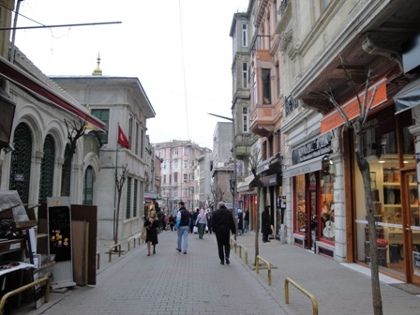Cristina Rotaru
If you’re walking the streets of the small area called Tünel in Istanbul’s Beyoglu you will find your senses overwhelmed by the strongest of smells and the most curious of sights, but, more importantly, by the number of music stores that fill the picture.
It’s all about the music around the Galata Tower – and you are unlikely to leave the place without humming a tune, regardless of whether it’s “Light my Fire” or some traditional Turkish folk melody the name of which you can’t even pronounce.
Be it Wednesday morning or Saturday evening, people here seem to always be out and about, working, smoking, yelling in the streets, drinking tea (cay), all of which are accompanied by some kind of sound. It is a musician’s dream, this picturesque image of Southeastern Europe, and by the looks of it, this once-upon-a-time shabby area is contributing to the district’s rejuvenation project.
Life here follows its normal course, completely undisturbed by the outside world and it seems as if it was this way since the beginning of time. But this place has, as the environment suggests, a much more complex history than that.
The Byzantines called it Pera, the “opposite shore,” and the Ottoman Turks used the ancient name Galata, for which two etymologies are posited: either the Italian “calata” meaning “streets of steps” or “galactos” meaning “milk”. The Venetian trading company to which it served as home, elicited serious suspicions from the Byzantines: they distrusted this area, so much so that in 1185 there was even a hostile outburst between the populations of Constantinople and that of Galata, which went on for well over 20 years. From that time on, the hatred on the “opposite shore” increased gradually and after over half a century of Latin occupation, Constantinople was restored to the victorious Paleologian dynasty. Even after the Ottomans took hold of Istanbul, Galata’s autonomous status was left untouched. It looks as though the area has preserved all of its historical buildings intact, which is not the case for the cultural heritage and the social structure. The shift of the neighbourhood since the 19’/60s, since it started sinking into poverty, was quite tremendous. But the recent influx of the new generation of foreigners, artists and tourists are slowly transforming Galata, and its reputation for music stores is becoming more and more established.
But the history of it all is nothing but a tale, after all, and at the sight of all these music shops that seem to have monopoly over the area, you can only wonder how it is that they earn their living – competition is ferocious. Reputation is one thing, but owning a buisness and surviving in the market is a whole different story.
Ferhat Karatas has been working in the La-Fa music store for the last 10 years. He is his own boss, so he doesn’t really see it as work. And by the looks of it, it doesn’t appear very stressful either – he’s sitting in the corner of his shop, sipping tea and chatting with his friend, Fikret Kaya, who owns the music store next door. I politely introduce myself and ask if they’d be willing to answer some questions for a short while. Next thing I know, I’m sitting down with them with a glass of çay in my hand, conversing about daily Istanbul life.
Ferhat is 40 years old and has been living in the city for all of his life. Business is going well, he says, despite the massive competition. La-Fa sells professional instruments and recording gear and he takes pride in the fact that he managed to keep it up and running for so long. “Pianos are especially sought after these days,” he explains, “and we have the best ones”. Acoustic guitars are a close umber 2 on his best selling list and he imports them straight from Spain. Prices range from somewhere between 200 and 2000 American dollars. I ask if this is a common thing, setting the price in USD and not Turkish Lira, and if it’s because his customers are mostly tourists roaming around the area. His response is definitive and concise and I almost feel guilty for asking such a question: No. As a matter of fact, there are far more local Turkish people who come here to procure their equipment than foreigners, and tourists do what they usually do, come in, smile, look around and leave – they seldom buy anything substantial and worth mentioning.
Fikret Kaya is about the same age as Ferhat and is also a born and raised Istanbulian. He works on Galipdede Caddesi in Senkron, another one of the many music stores of the area. If he could describe his own life in one word, then it would be this: music. He taught himself to play every known and unknown instrument, but his favorite one is the piano. Should he play something for me, he asks, and before I open my mouth to give him an answer, he’s already sitting at the big red piano warming up his fingers. He plays an old Anatolian song that he learned when he was young, without the use of any kind of music notes, of course, and without the help of anyone else, because he’s the only one in his family who plays music. He invites me to join his party, and I feel lucky that I’m able to do it thanks to some years of piano lessons in my home country, and then it hits me: this is it, the buzz, the feeling of playing music in some random street in Istanbul, this is what makes everything better. He seems reluctant when I ask him about what he used to do before he opened his store, or maybe it’s because he doesn’t understand my question, as I have to ask him three times before I get a bittersweet smile in return.
Despite the obvious communication and understanding issues I face, I see now that people have deep passion for their work. I visit more than 10 stores in order to be able to talk to 3 of the owners, the others are either too busy or not willing to subject themselves to the stress of talking in English. Some young boys working at the Ozan music store agree to offer me two minutes of their precious time, and I find myself following them around the store as they carry what seems to be heavy equipment from one room to the other. I find out that their store is open about 14 hours a day, from 10 am to midnight, and they don’t even work in shifts. But they like their jobs and it keeps them active, which is what ultimately matters at the end of the day, even though the pay isn’t that great.
There is no doubt about it, the conclusion is unanimous: Galata is all about the music. Just you try to get away from it, just you try to escape, there’s no way around it. It fills you up and consumes your insides. It doesn’t matter if it’s a job or a hobby or both. Nothing matters anymore. Just close your eyes and feel the wind of Istanbul blow straight through you, embrace this sensation and don’t try to fight it. You will find that it’s a great feeling, the music of the city. It creeps in and never leaves you.







